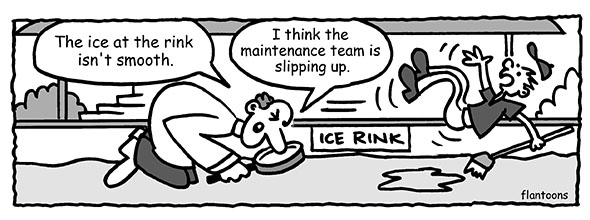
The simple present is the tense you use for any habitual action. Use it for things that you always do, are regular or true.
Lisa likes football.
Water boils at 100 °C.
I don't eat meat.
I clean my room every day.
Homophones are words that have a different spelling, different meaning but the same pronunciation.
For example:
I went to the sea to see my friend.
The words sea and see have the same pronunciation but different meanings and spellings.
Buy her a present for her birthday.
She lives by a park.
Up is a small word with a wide use in English. Today we look at phrasal verbs and collocations that feature it.
All can be an adverb, preposition, adjective noun and verb. Read through this text and choose the correct missing words.
Because most native English speakers pronounce the words there, their and they're the same way, it can be difficult to understand the difference in meaning. The difference in meaning is very important when writing. Using the wrong one in your email is a big mistake. Let's find out the difference in meaning.
There is used to show that something exists or happens. Use there for positions - there is the opposite of here.
Is there a post office nearby?
Some words are more than one part of speech. For example, cook is both a verb and a noun.
Noun: The cook is busy in the kitchen.
Verb: I don't want to cook, let's go to a restaurant instead.
A verb is a word that describes an action, state or occurrence. He are some basic forms of the verb walk.
According to Chinese zodiac, 2014 is the year of the horse. The previous horse years were 2002, 1990 and 1978. People born in the year of the horse are said to be a bit like horses.
"Horse personalities" are said to be very active, ambitious, multi-taskers and fond of exercise. On the other hand, negative aspects of horses are they may be impatient, greedy and unconcerned with the problems of others.
Saint Patrick's Day is a cultural and religious holiday _1_ every year on 17 March, the death date of the most commonly-recognised patron saint of Ireland, Saint Patrick. A patron saint is a saint who is believed to _2_ a particular place or type of person.
Read through these three paragraphs. Can you tell what the orange words are? All the letters have been scrambled. Rearrange the letters to find the correct spellings.
I broke my leg playing football. My friends called an ecnaalubm to take me to hospital. It took 20 minutes to arrive.

This cartoon is based on the double meaning of slip.
Slip as a verb means to lose balance and perhaps fall, especially on a slippery surface like ice.
"Be careful of the ice. You might slip."
"She slipped on the wet floor and broke her ankle."
In English we don't make our homework, we do our homework. We don't do a mistake, we make a mistake. We don't make a party, we have a party. These are examples of collocations. Collocations are combinations of words which are usually used together.